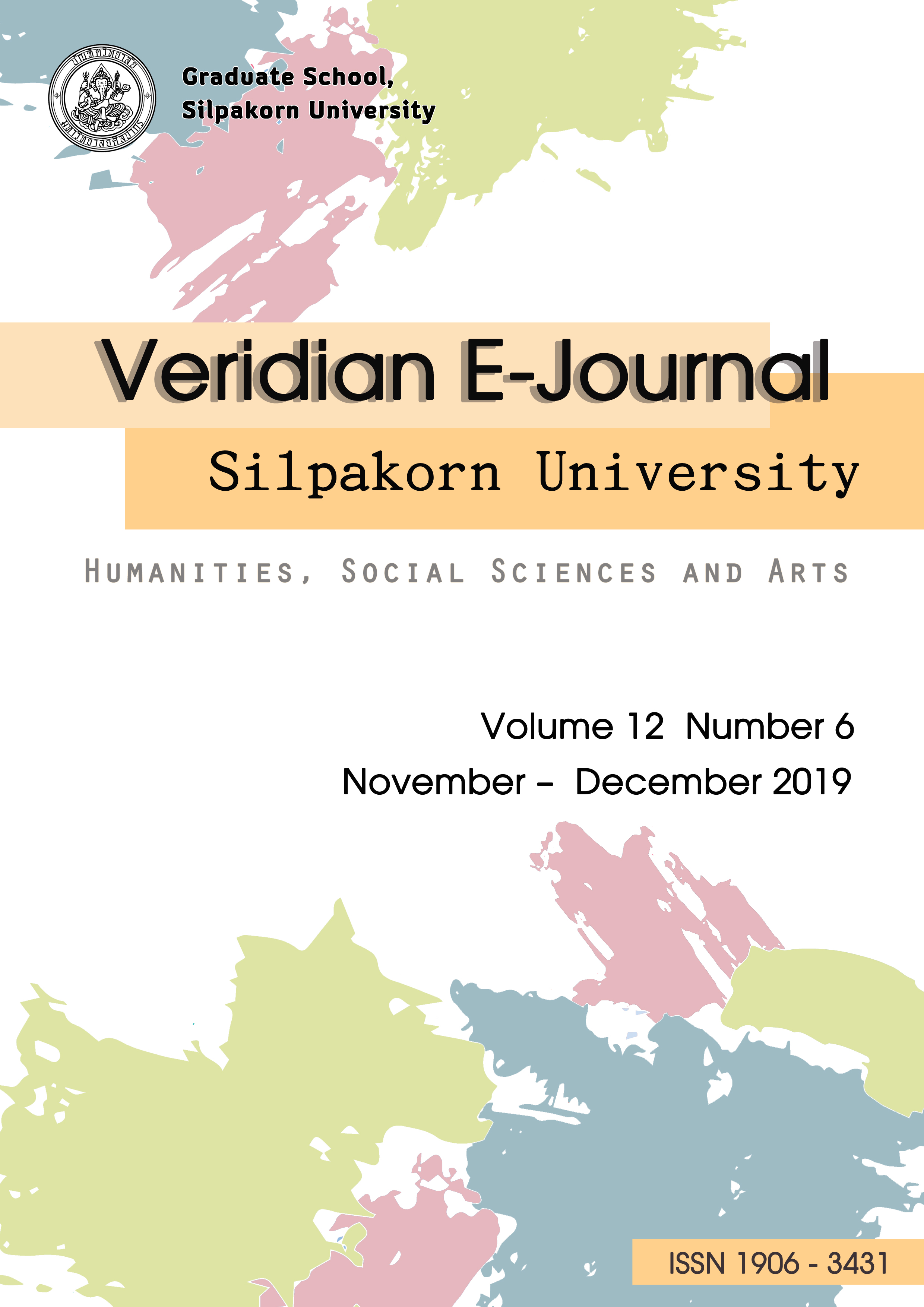การศึกษาการดำเนินงานและถอดบทเรียนของศูนย์พัฒนาครอบครัวในชุมชน จังหวัดยโสธร (A Study of Work Performance and Lessons Learned of Community Family Development Center in Yasothon Province)
Main Article Content
Abstract
บทความนี้เป็นการเสนอผลการศึกษาการดำเนินงานและถอดบทเรียนของศูนย์พัฒนาครอบครัวในชุมชน (ศพค.) กรณีศึกษาจังหวัดยโสธร โดยมีวัตถุประสงค์ 1) เพื่อศึกษาการดำเนินงานของศูนย์พัฒนาครอบครัวในชุมชนจังหวัดยโสธร 2) เพื่อศึกษาปัจจัยที่ทำให้เกิดความสำเร็จในการดำเนินงานของศูนย์พัฒนาครอบครัวในชุมชนจังหวัดยโสธร และ 3) เพื่อศึกษาข้อเสนอแนะในการดำเนินงานของศูนย์พัฒนาครอบครัวในชุมชนจังหวัดยโสธร โดยมีรูปแบบการศึกษาเป็นการศึกษาเชิงคุณภาพ เก็บข้อมูลโดยการสืบค้นข้อมูลเอกสาร ตำราวิชาการ และใช้วิธีการสัมภาษณ์ เครื่องมือที่ใช้ในงานวิจัยชิ้นนี้คือ การสัมภาษณ์ กลุ่มตัวอย่างที่ใช้ในการศึกษา คือ เจ้าหน้าที่ที่ปฏิบัติงานใน ศพค. ได้แก่ หัวหน้าคณะทำงาน ที่ปรึกษาและคณะทำงาน จำนวน 12 คน ผลการศึกษาได้จากการวิเคราะห์ข้อมูลจากเอกสาร ตำราวิชาการ และถอดความจากบทสัมภาษณ์และรายงานผลด้วยการพรรณนา
ผลการศึกษาพบว่า 1) ศพค. ทั้ง 4 แห่ง มีรูปแบบการดำเนินการเชิงรุก กล่าวคือ ศพค.มีสำนักงานที่ตั้งอยู่ในพื้นที่ที่สะดวกต่อผู้ใช้บริการ ทั้งมีการจัดโครงการอบรมและจัดกิจกรรมที่จะมุ่งเน้นที่จะพัฒนาคุณภาพของประชาชนในท้องถิ่น โดยมีผู้นำของชุมชนและหน่วยงานในท้องถิ่นที่เกี่ยวข้อง อาทิ โรงพยาบาลส่งเสริมสุขภาพตำบล (รพ.สต.) อาสาสมัครพัฒนาสังคมและความมั่นคงของมนุษย์ (อพม.) อาสาสมัครสาธารณสุขประจำหมู่บ้าน (อสม.) มีส่วนร่วมในการดำเนินงาน รูปแบบของการดำเนินการจัดกิจกรรม เป็นการจัดอบรมให้ความรู้ที่เป็นประโยชน์แก่สถาบันครอบครัวและมีการจัดกิจกรรมเพื่อเสริมสร้างสัมพันธภาพของคนในครอบครัว ในบางพื้นที่พบว่ามีการลงพื้นที่เยี่ยมครอบครัวเพื่อให้เข้าถึงปัญหาได้มากขึ้น และผลของการจัดกิจกรรมดังที่กล่าวมาทำให้ประชาชนในพื้นที่สามารถเข้าถึงข้อมูลข่าวสารและได้รับความรู้ที่เกี่ยวกับสถาบันครอบครัวได้ง่ายและครอบคลุม ส่งผลให้ปัญหาภายในครอบครัวใน 4 ตำบลนี้มีจำนวนลดลง สมาชิกในครอบครัวมีความสัมพันธ์ที่ดีต่อกันเพิ่มมากขึ้น ทั้งปัญหาด้านการใช้ความรุนแรงลดลงทำให้สถาบันครอบครัวเข้มแข็ง 2) ปัจจัยที่ทำให้การดำเนินงานของ ศพค. ทั้ง 4 แห่ง เกิดผลสำเร็จได้เพราะมีคณะทำงานที่เข้มแข็ง เข้าใจถึงกระบวนการและจุดประสงค์ของโครงการ และใส่ใจที่จะแก้ปัญหาที่เกิดขึ้นในชุมชนของตนเอง ทั้งประชาชนในพื้นที่ให้ความร่วมมือกับการดำเนินกิจกรรมเป็นอย่างดี และได้รับการสนับสนุนจากหน่วยงานเครือข่ายที่เกี่ยวข้อง ทำให้การดำเนินโครงการเป็นไปอย่างมีประสิทธิภาพจากผลลัพธ์ที่เกิดขึ้นหลังการดำเนินจัดกิจกรรมและโครงการต่าง ๆ จึงทำให้ ศพค. ทั้ง 4 แห่ง ได้รับการประเมินให้มีผลการดำเนินงานในระดับดีเด่นและดี และ 3) ในด้านของข้อเสนอแนะในการดำเนินงานของ ศพค. นั้นพบว่ามีปัญหาในเรื่องของงบประมาณที่ไม่เพียงพอต่อการดำเนินการตามแผนดำเนินการที่กำหนดไว้ ส่งผลต่อประสิทธิภาพในการดำเนินงานของ ศพค. และทำให้ไม่มีความต่อเนื่องและไม่สามารถดำเนินการให้ครอบคลุมต่อการจัดการปัญหาครอบครัวในทุกด้านได้อย่างมีประสิทธิภาพ
This article aimed to present the study of operation and lessons learned of the Community Family Development Center with the case study in Yasothon. The purposes are 1) To study the operation of the Community Family Development Center in Yasothon, 2) To study the factors of the successful operation of the Community Family Development Center in Yasothon, and 3) To study suggestions for the operation of the Community Family Development Center in Yasothon. The research was designed to be qualitative by collecting data from papers, academic textbooks, and interviews. The research instrument was in-deep interview. The target group was 12 operating officers in the Community Family Development Center including heads of the officers, supervisors, and officers. The results were gathered from analyses of information from academic textbooks and paraphrase of the interview and were reported with description.
The results illustrated as following details: 1) There were proactive operations in 4 branches of Community Family Development Centers. There were offices in local areas which were convenient for customers. Moreover, there were training programs activities organized to develop the quality of people in local areas by local leaders of communities and related corporations such as Health Promoting Hospitals in districts, Social Development and Human Security Volunteers (SDHSV), Village Health Volunteers (VHV). They provided fruitful knowledge for the family unit and there were activities to strengthen the relationship within family members. In some areas, the families were visited so the problems could be observed more precisely. Finally, the results of the activities had people in the local areas get access to information and knowledge about the family unit more conveniently and thoroughly. Thus, the problems within families in 4 districts were reduced. Besides, the relationship of family members had been improved. Furthermore, the problems about violence were reduced and that entailed the strong family unit. 2) The factors that caused the operations of 4 branches of Community Family Development Center successful were the efficient teamwork, the understanding of the process and the purposes of the project, and attention to fix problems in their areas. Moreover, people in local areas mutually participated in the activities and related departments provided supports which caused the efficient operation of the project. Ultimately, all 4 branches received very good and good levels in the satisfaction survey. 3) For the suggestions of the operation of the Community Family Development Center, it was found that there were problems with insufficient funding to conduct the project as it had been planned. Hence, it caused discontinuity and incomprehensive problem-solving of the family unit.

